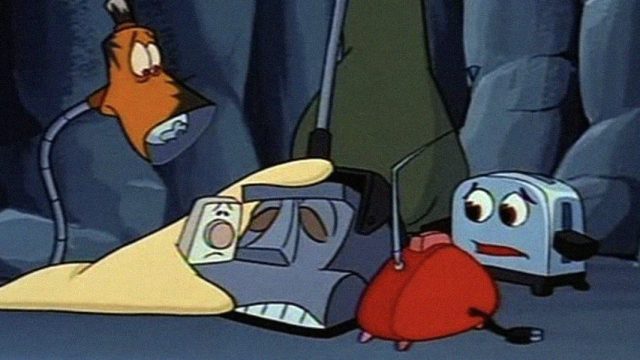The Brave Little Toaster isn’t how I remembered it.
Jerry Rees’ 1987 animated musical adventure The Brave Little Toaster is a movie that for the longest time, I remembered quite fondly. I remember thinking as a kid that this film was a really happy, fun thing to watch. The animation caught my attention, all the characters were cute, there were catchy songs… What more could there be to it? However, upon revisiting it in as an adult, I’ve come to realize that maybe I only remembered the “fun” parts. Because now, I realize this is far, far darker than I had first recalled. Between the characters witnessing deaths and violent maimings and the existential questions of one’s worth in society, I’ve come to realize that this Rees’ film may have subconsciously played a part in my own life growing up.
Over the last few years, and especially now post-college, in a pandemic, I’ve grown to have a lot of fears and anxieties about whether I have some sort of measurable worth. Because of this, I think I understandThe Brave Little Toaster much better now. The film begins with a few household appliances getting left behind by their previous owners, and over the course of the first act, they begin to realize that no one is coming back for them. So, they set off to find their lost family. Rees himself has said that the film’s themes include, “the fear of being abandoned” and the desire to “reunit[e] with someone that you love.” As a child, these deeper themes eluded me, but now I understand them more than I ever have. Solitude is scary. Of course, it’s perfectly fine to be independent, but as human beings, we have a natural desire for dependency, even if just a little. Whether it be family, friends, or a significant other… connection is a part of living. So, household appliances, things created to be useful, are surprisingly relatable. Who doesn’t want to feel useful?
But with that idea comes its antithesis. Uselessness. Which just so happens to be another major theme in this film. In the final act, there’s a song quite literally called “Worthless.” The opening lyrics of which are, “I can’t take this kind of pressure/I must confess one more dusty road.Would be just a road too long./Worthless.” Immediately following, the broken-down car singing these lyrics is brutally crushed to death. What follows is a group of other broken-down cars singing about their own worthlessness, awaiting their own deaths, fearful, but also seemingly accepting of this fate. Prior to reviewing The Brave Little Toaster, I somehow repressed the fact that there is a scene with a bunch of depressed characters getting killed. The biggest reason for each of their depressions, though, is that they’ve quite literally been dumped.
The film then ends with the household appliances escaping the clutches of death with a newfound hope for life as they reunite with an old “family” member. However, in that reunion, the titular toaster sacrifices themselves in order to save the old owner. Then afterwards, that same owner repairs the toaster, and they once again have some sort of use. I think this plays into the theme of how important it is to have some form of connection in life. Self-love and independence are important, but equally important is having someone to lean on. As proven in an early scene involving an air conditioner, keeping things to yourself and bottling up feelings can cause you to explode. In moments of doubt and feelings of worthlessness, the best thing to do is to have someone help. Someone there to help fix the parts of you that may be broken. For an animated film about a blanket, a vacuum, a lamp, a radio, and a brave little toaster…this sure hits on some important themes and is both much deeper and more rewarding to view as an adult.

